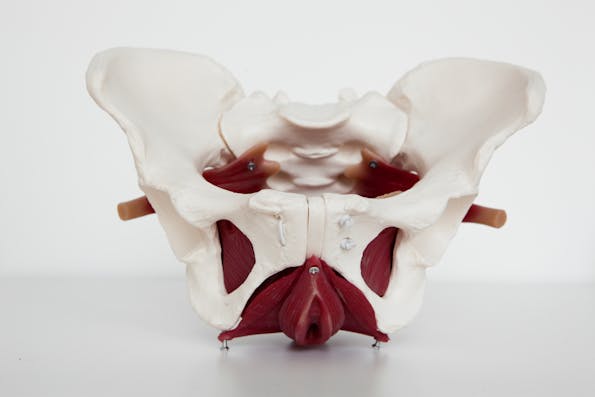
Where are the pelvic floor muscles located? Most people don’t know. Not a problem at all as long as they reliably fulfil their tasks. The pelvic floor, which consists of muscles and connective tissue, has three functions:
- Tension (the pelvic floor supports the sphincters of the bladder and anus)
- Relaxation (during urination, bowel movements)
- Counteraction (the pelvic floor must prevent uncontrolled urine loss when sneezing, coughing, hopping or laughing)
Both sexes experience the pelvic floor muscles to become weaker over time. Overweight, physical overload, poor posture and operations in the pelvic area can be further reasons for a flaccid pelvic floor.
Women usually struggle with difficulties after pregnancy and childbirth. According to studies (Nygaard et al., 2008), 18.4 percent of mothers suffer from urinary incontinence. After multiple birth, 32.4 percent suffer from urinary incontinence.
Urinary incontinence
Urinary incontinence is only one of the problems caused by a weakened pelvic floor. Stool incontinence, flatulence, bladder, uterus and intestinal prolapse also occur as well as various sexual problems such as pain during sexual intercourse (dyspareunia) or vaginal cramps (vaginismus).
With professional guidance, the muscles hidden in the abdomen can be trained well. Based on a conversation and a detailed check-up, we determine the goals of the therapy. Our specialized physiotherapists use a wide range of methods. These include relaxation exercises and techniques for targeted strengthening of the pelvic floor muscles.
Biofeedback
Modern technology is a great help. With so-called biofeedback, muscle contraction can be measured objectively. A probe inserted into the vagina or anus measures if and how tense the pelvic floor muscles are.
The technology not only helps with diagnosis, but also with therapy. Electrostimulation stimulates the pelvic floor muscles with weak electrical impulses. Depending on the type and strength of the muscle tension, the impulses become stronger or weaker. However, the treatment is never painful. In addition, we would never do anything against your will.


